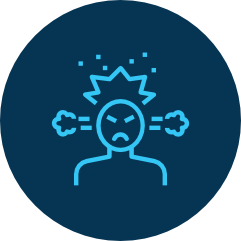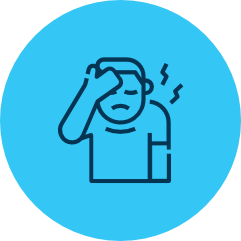Sleep Deprivation
Last updated: December 2021
Home > Information & Support > Adults >Sleep deprivation, also known as insufficient sleep or sleeplessness, is the condition of not having enough sleep. It can be either chronic or acute and may vary widely in severity.
In today’s busy world we’re all very eager to believe that sleeping one hour less will give us one more hour of productivity but in reality, it’s likely to have the opposite effect. Sleep is not a passive process – during good restorative sleep we grow, make sense of our days and detox.
What are the effects of sleep deprivation on health?
Just one night of interrupted sleep negatively affects mood, attention span and cognitive ability. But an occasional night where sleep is disturbed won’t harm your health – you’ll just be tired the next day, and grumpier!
Chronic sleep debt, however, can have a seriously damaging effect on our mental and physical health. A good night’s sleep is vital as a restorative time and plays a significant role in healing and repairing the heart and blood vessels. It also gives the immune system and the cardiovascular system a rest and allows other organs to be restored.
Research has found that those who frequently get fewer than six hours a night are at significantly increased risk of stroke and heart disease, with evidence that not sleeping enough may ramp up the ‘fight or flight’ response to stress, releasing hormones that speed up heart rate and raise blood pressure.
Regular poor sleep also puts you at risk of serious medical conditions, including obesity and diabetes – and it shortens your life expectancy. Lack of sleep can increase insulin resistance, a risk factor for the development of type 2 diabetes and heart disease. Shortened sleep can increase CRP, or C-reactive protein, which is released with stress and inflammation. Studies have suggested that people who usually sleep less than five hours a night have an increased risk of having or developing diabetes. It seems that missing out on deep sleep may lead to type 2 diabetes by changing the way the body processes glucose – the high-energy carbohydrate that cells use for fuel.
Lack of sleep also suppresses your immune system making you more vulnerable to infections and metabolic and hormone changes. Research has found that getting a good night’s sleep strengthens the immune response suggesting that the release of certain hormones during sleep boosts the immune system.
Sleep deprivation impacts in serious ways. Tiredness can impact on driving ability, reaction times and judgement and causes poor concentration, thinking, memory, increased irritability and hostility.
Sleeplessness leads to hallucinations and sensory dysfunction. Noises become louder, vision is affected and sufferers start to isolate themselves. Sleep deprivation can lead to mental meltdown. Forcing someone to stay awake is a known torture technique used in enemy interrogation!
Broken or interrupted sleep can leave you feeling as sleep deprived as if you’d just had four hours rest a night because you are disrupting the natural sleep rhythm. It may mean you do not reach the most restorative, deeper phases of sleep.
Signs of sleep deprivation

Yawning

Irritability

Fatigue

Depressed

Moodiness

Forgetfulness

Difficulty concentrating

Increased appetite

Clumsiness

Reduced sex drive

Lack of motivation

Increased sickness
How much sleep do I need?
While there is no magic number for how much sleep we should get, there is a general consensus that around seven to eight hours is best. Experts believe that most adults require somewhere between six and nine hours in order to feel refreshed and to function well both mentally and physically. It’s important not to get too hung up on your sleep quantity – one size doesn’t fit all – but focus on sleep quality instead.
However research seems to show that regularly sleeping less than six hours is associated with many of the adverse effects of sleep deprivation. If you do find yourself regularly getting less than six hours a night and are exhausted the next day, then it might be time to overhaul your sleep and lifestyle habits.
How can I improve sleep?
There are no magic solutions but there is support to help people develop healthy sleeping habits to improve sleep quality. It’s surprising how quickly a minor issue can escalate into something more serious, such as chronic insomnia.
To ensure you experience good sleep it’s essential to follow good lifestyle habits and to eliminate the factors that are causing you disturbed sleep. For example making sure that your bedroom is the right environment (cool, dark and quiet), that your bed is up to scratch, looking at the lighting in your home, and avoiding foods and drinks that can hinder sleep. Avoid screen time at least an hour before bed and find alternative ways of relaxing like warm baths with calming scents, quiet soothing music, reading, gentle stretching and yoga. It’s also important to establish regular sleep pattern – going to bed and waking up at roughly the same time. Your bodies and minds will feel much better for it.
Stay in touch
Sign up to our mailing list to keep in touch with our latest news, events and developments as well as regular sleep advice and how you can get involved with us on our awareness campaigns. We will never share your data with anyone else.
